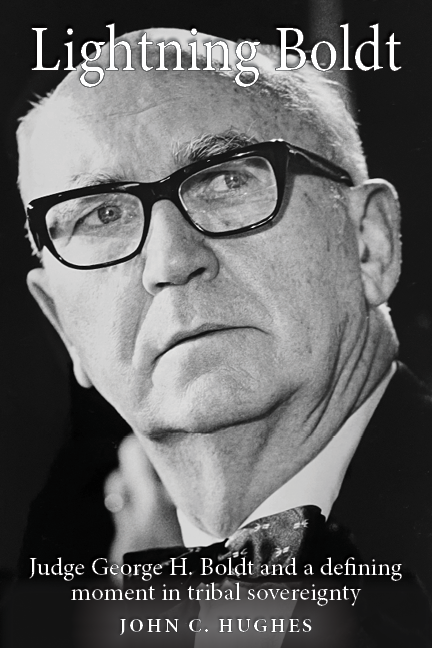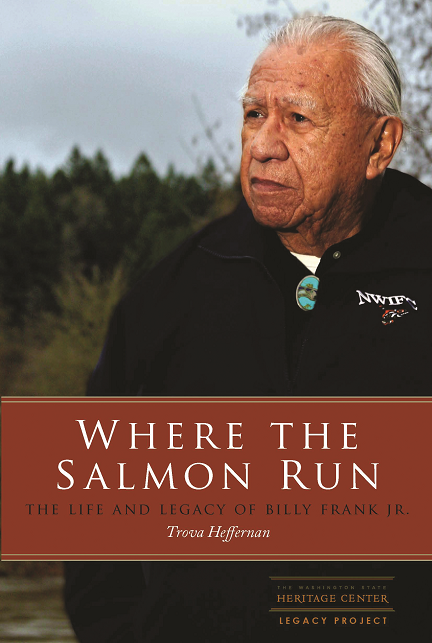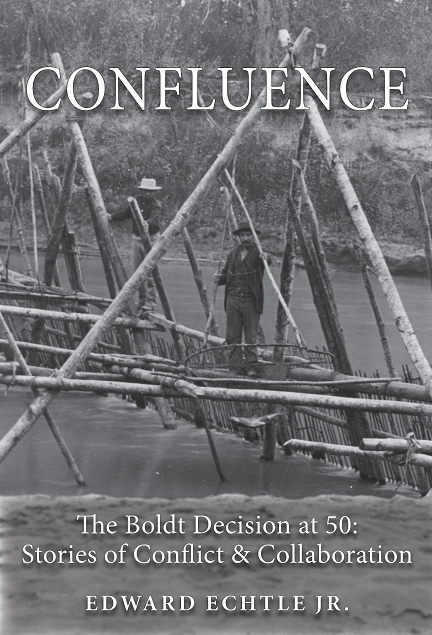The Boldt Decision
.png)
In the 1850s, as tribes native to the Pacific Northwest were faced with the reality of the westward expansion of the United States, many of those tribes were compelled to enter treaties with the newly founded Washington Territory. Governor Isaac Stevens’ party negotiated to remove tribes from their lands onto reservations as other settlers moved into their ancestral grounds. Numerous goods and services were promised, but one important entitlement was outlined—that they could continue to fish in their “usual and accustomed” places. The State of Washington did not keep this promise.
A century later, the “Fish Wars” pitted activists like Billy Frank Jr, Hank Adams, Bob Satiacum, and Ramona Bennett against law enforcement. The activists claimed they were exercising their treaty rights. The state claimed those agreements were outdated and superseded by state law. In 1970, the U.S. Justice Department filed United States of America v. State of Washington to resolve the issue. Judge George H. Boldt handed down his famous decision, enshrining the promise of those treaties and allowing tribes up to half of the harvest, on February 12, 1974. In honor of fifty years of the Boldt Decision, here is a collection of works by Legacy Washington that highlight treaty fishing rights and management.
Lightning Boldt
 |
On February 12, 1974, Lincoln’s Birthday, “The Boldt Decision” on treaty tribe fishing rights stunned the state. Federal Judge George H. Boldt ruled that the State of Washington had disregarded solemn promises made to the tribes in the 1850s. Now, Boldt said, they were entitled to up to 50 percent of the catch in their “usual and accustomed places.” The decision generated a tsunami of protest from non-Indian commercial fishermen and sports fishermen. Al Ziontz, the Seattle attorney who represented several tribes, said Boldt’s ruling was much more than a fishing-rights decision: “It is an Indian survival case. It is a case that gave the tribes the standing—the power—to sit down at the table with other governments as equals.”
This compelling biography explores George Boldt’s eventful life. An immigrant’s son, he persevered through a bumpy childhood and became a huge success as a champion debater and yell king at the University of Montana. He went on to become one of Seattle’s most admired attorneys and the governor’s versatile legal trouble-shooter. During World War II, Boldt was an OSS officer on the front lines in Burma, directing covert operations against the Japanese Army with the help of Nisei interpreters. Early in his career on the bench, he was dubbed “Lightning Boldt” for his efficiency. He threw the book at brazen mobsters and jailed union leaders who misused their power. When the fishing-rights case landed in his Tacoma courtroom, the tribes and their attorneys feared their case was in jeopardy.
Click on the image to purchase.
|
Where the Salmon Run
|
Billy Frank Jr. was a fisherman, and he hoped that's how history would remember him. He was not a casual angler; fishing was part of Billy's DNA. Decades ago, in a far different America, salmon wars erupted on Northwest rivers. Many tribal members took a stand for treaty-guaranteed fishing rights. Billy Frank was one of them: "I wasn't the Billy Frank that I am now," the Nisqually tribal leader told reporters in 1984, "I was a bitter person."
Says friend Tom Keefe, "When I look at Billy Frank, ... I can say there is a guy who decided that he could change the world by changing himself."
Frank rose from those riverbank skirmishes to become a visionary leader known across the world. While court battles over fishing rights continue, Frank's enduring message is to protect the salmon, still struggling to survive.
In a society fascinated by advancing technology, the story of this Nisqually Indian will take you back to nature. In its pages, he shows the great rivers where the salmon run, and tells the story of his mysterious fish.
Click on the image to purchase.
|
 |
|
|
Confluence
 |
Five individuals with lifelong ties to salmon, treaty rights, and collaborative management share their recollections of the half-century since the Boldt Decision. Each represents different facets of the larger story:
- Ed Johnstone Jr., current chair of the Northwest Indian Fisheries Commission, shares how his Quinault family and community’s early involvement in the fight for treaty rights and salmon protection steered his life toward his current work.
- Mason Morisset, attorney, has represented tribal interests since 1968 including before the U.S. Supreme Court, addresses legal misunderstandings and disinformation that persists around the Boldt Decision.
- Charlene Krise, director of the Squaxin Island Museum, began fishing commercially with her tribe in the 1970s because of the opportunities the Boldt Decision provided, later becoming an environmental advocate for her community.
- Jim Waldo, an attorney raised in Seattle, partnered with the late Billy Frank Jr. and many others to facilitate talks between business, government officials and tribes at odds over salmon and environmental stewardship.
- Kadi Bizyayeva, the young director of the Stillaguamish Department of Natural Resources, shares her journey from administrative staffer to committed advocate of her people’s right to protect the salmon and the environment.
Click on the image to purchase.
|
Addtional Resources
Want more related content? Check out these links:
Read "Hank Adams: An Uncommon Life" from our "Who ARE We? Washington's Kaleidoscope" project and visit his virtual exhibit panel.
Learn about Washington tribes in our "We're Still Here: The Survival of WA Indians" virtual exhibit.
"Fish Wars" activist and leader Janet McCloud and Fawn Sharp, who learned from McCloud, Frank, and other treaty rights advocates are the two remarkable women featured on the "Environment" panel from our "Ahead of the Curve" exhibit.